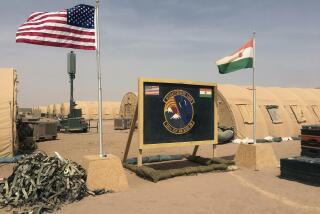A Lesson in Bosnia for U.S.
- Share via
In November 1995, President Clinton said the United States would send troops to Bosnia-Herzegovina for 12 months. Nearly eight years later, 1,500 U.S. troops are still there, separating groups that hate each other and providing a valuable lesson in the difficulty of rebuilding a nation racked by war. The lessons of Bosnia should prepare Americans to see their forces in Iraq years from now, even if other nations change their minds and contribute substantial numbers of troops.
Clinton was gearing up for reelection when he low-balled the troop timetable, and his remarks met justified skepticism. International agreements put Bosnia-Herzegovina under international control, and today a foreign ruler who can fire officeholders and impose new laws remains in charge.
Signs of progress have been limited: Foreign troops number about 12,000, including Americans, down from around 60,000 at the peak; Serbs, Croats and Muslims rotate the presidency and an elected legislature is laboring to make the country independent again.
Dragan Covic, a Croat and the current Bosnian president, recently visited the United States to seek foreign investment, not an easy assignment for a man facing charges at home of illegal business dealings. Give him credit for “spin.” He says the allegations against him result from “political pressure” and the judicial proceedings indicate no one is above the law.
Although the country has been quiet recently, Croats, Serbs and Muslims live apart from each other and last year a multiethnic political party lost elections to parties representing the three separate communities. Foreign aid has passed the $5-billion mark, but unemployment is around 50% in some areas and dependence on outside assistance shows no signs of lessening.
Paddy Ashdown, the nation’s British overseer, deserves credit for pushing for the establishment of an independent judiciary and an economy free from the shackles of the former Yugoslavia’s communism. He needs to warn the Bosnians that the crutch of international aid will be pulled out someday and they must have factories producing the beer, soap and toasters people will be willing to buy.
The agreement that ended the war in which 200,000 were killed was forged in Dayton, Ohio. Americans patrolling in Tuzla help enforce the peace, and NATO nations provide the bulk of the troops and much of the foreign aid. It’s a good example of international cooperation. A hard-and-fast deadline to remove troops and reduce aid wouldn’t benefit the country now. But Bosnians should set their own timetable, and the end should be in sight -- sooner, rather than later.
More to Read
Sign up for Essential California
The most important California stories and recommendations in your inbox every morning.
You may occasionally receive promotional content from the Los Angeles Times.













